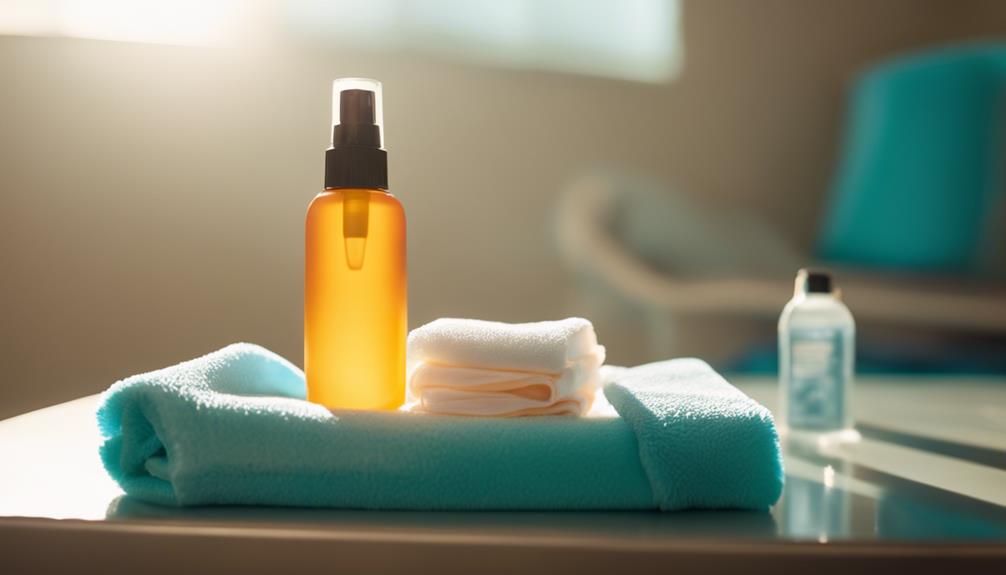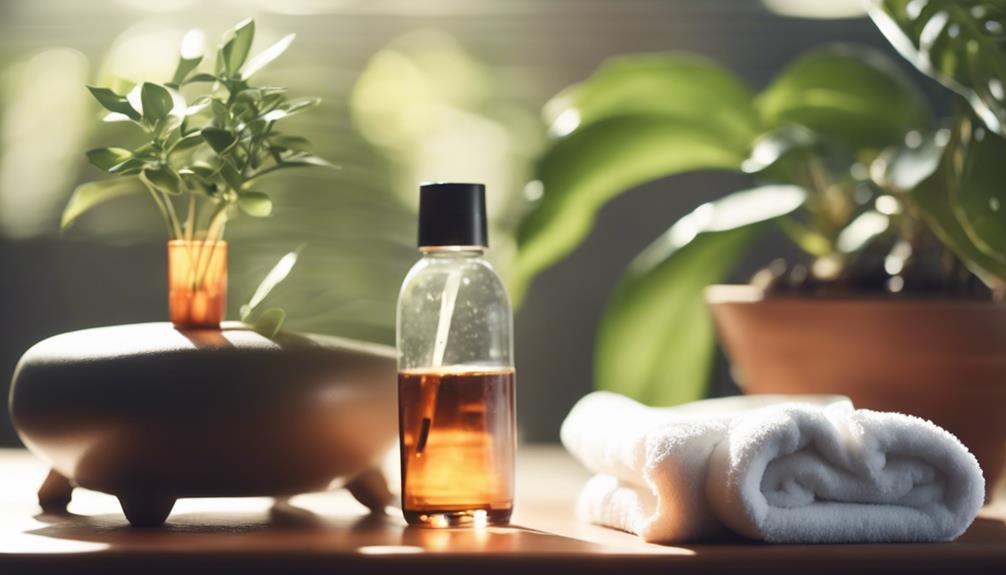Establishing a regular skincare regimen is crucial for keeping your skin healthy. To begin, determine your skin type: normal, dry, oily, combination, or sensitive. Each day, make sure to use a gentle cleanser, toner, apply an antioxidant serum in the morning, and moisturize with SPF to shield your skin from harmful UV rays. In the evening, cleanse your face thoroughly and utilize targeted treatments or serums for any specific concerns such as wrinkles or dryness. Integrate exfoliation into your routine 1-3 times a week to eliminate dead skin cells and enhance absorption of skincare products. Hydration is essential, so you may want to include hydrating masks in your weekly routine. Stay tuned for more helpful tips and techniques to achieve fabulous skin!
Key Takeaways
- Understand your skin type to select suitable products for effective care and treatment.
- Follow a structured daily routine with cleansing, toning, serums, moisturizers, and sunscreen for optimal skin health.
- Exfoliate 1-3 times a week using suitable methods based on your skin type to remove dead skin cells.
- Incorporate targeted treatments and serums with active ingredients tailored to your specific skin concerns for best results.
Understanding Your Skin Type
To effectively care for your skin, you first need to identify your skin type, as this will guide your choice of products and routine. The five main skin types are normal, dry, oily, combination, and sensitive. Each type has unique characteristics that require specific care. For instance, combination skin usually has an oily T-zone while the cheeks may be drier, demanding a tailored approach to hydration and oil control.
If you have sensitive skin, you might notice irritation or redness after using certain products. It's important to choose gentle, hypoallergenic options that won't aggravate your skin concerns like acne or dryness.
Regularly evaluating your skin type is vital because your skin can change due to factors like age, climate, and lifestyle. By staying attuned to these changes, you can adjust your skincare routine accordingly.
Ultimately, understanding your skin type helps you select the right products, ensuring you address your specific needs effectively. So take the time to evaluate your skin, and you'll set the foundation for a successful skincare regimen that enhances your overall health and appearance.
Essential Steps for Daily Care

In your daily skincare routine, it's essential to focus on both your morning and nighttime practices.
Each step plays an important role in maintaining your skin's health and appearance.
Let's explore what you should include in each part of your day for best results.
Morning Routine Essentials
Start your morning routine by cleansing your face with a gentle cleanser that suits your skin type to effectively remove impurities accumulated overnight. This sets a fresh canvas for the rest of your skincare products.
Next, apply a toner to balance your skin's pH and enhance hydration.
Follow these important steps:
- Antioxidant serum: Incorporate a vitamin C serum to combat free radicals and boost skin luminosity.
- Lightweight moisturizer: Use a moisturizer containing hyaluronic acid to hydrate your skin while locking in moisture.
These steps create a solid foundation for healthy skin throughout the day.
Remember, each product plays a significant role in your morning routine. By cleansing, toning, and moisturizing, you prepare your skin for the challenges it might face.
With consistent care, you'll notice improvements in your skin's texture and overall appearance. Embrace these essentials, and you're on your way to radiant skin!
Nighttime Care Practices
A proper nighttime skincare routine is essential for repairing and rejuvenating your skin while you sleep.
Begin by thoroughly cleansing your face to remove makeup and impurities, preventing clogged pores and breakouts. Use a gentle cleanser suited for your skin type, ensuring your skin is clean and ready for treatment.
Next, apply a toner to balance your skin's pH. This step enhances the absorption of subsequent products, promoting a healthy complexion.
Follow up with a targeted serum, like retinol or hyaluronic acid, to address specific concerns such as aging or dehydration. This concentrated treatment works overnight to deliver visible results.
After applying the serum, it's time for a suitable moisturizer. Choose one designed for your skin type to lock in hydration and support your skin's barrier while you sleep.
To boost moisture and nourishment, consider incorporating a night cream into your routine. For an extra treat, add a face oil or sleeping mask once a week.
Weekly Exfoliation Techniques
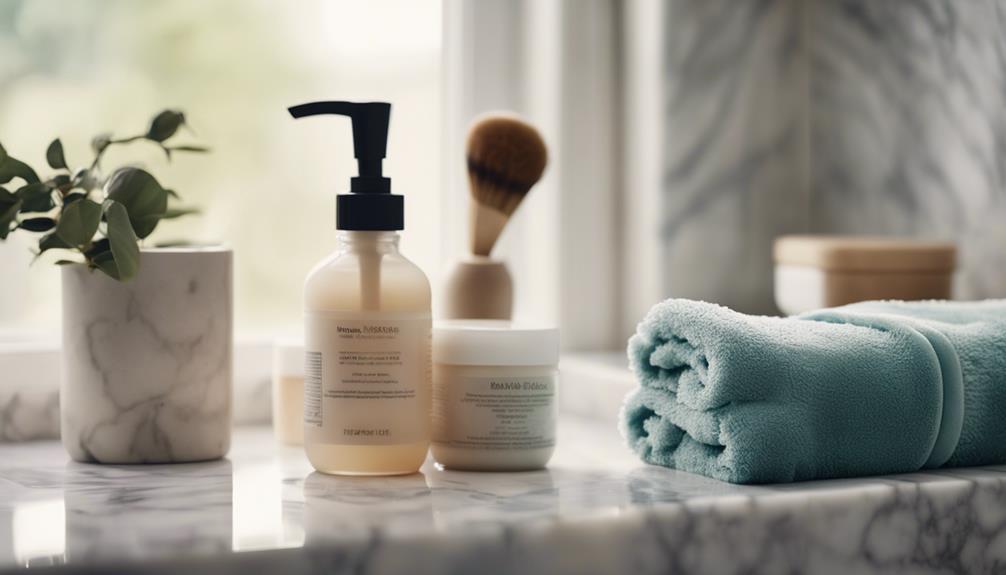
When it comes to weekly exfoliation, you need to choose the right method that suits your skin type.
Consider how often you should exfoliate and the best time to fit it into your routine.
Don't forget to care for your skin afterward to keep it hydrated and healthy!
Choosing Exfoliation Method
Choosing the right exfoliation method can greatly impact your skin's health and appearance. You have two primary options: physical and chemical exfoliants.
Physical exfoliants, like scrubs or brushes, slough off dead skin cells through friction, while chemical exfoliants, such as AHAs or BHAs, dissolve dead skin without abrasion. To determine which method suits you best, consider your skin type and specific concerns.
- Sensitive skin: Opt for gentle, lower concentrations of chemical exfoliants.
- Oily or acne-prone skin: Salicylic acid can help unclog pores and reduce breakouts.
Incorporating exfoliation into your routine promotes healthy skin cell turnover and prevents clogged pores. Remember to follow up with a hydrating moisturizer after exfoliating.
This step replenishes your skin's moisture barrier and mitigates potential irritation. Finding the right balance will help you achieve a smoother, more radiant complexion, so take the time to experiment with different exfoliation methods and see which one works best for you.
Frequency and Timing
Exfoliating your skin 1-3 times a week can greatly enhance its texture and appearance. The key is to find the right frequency that suits your skin type and concerns. Over-exfoliation can lead to irritation, so listen to your skin and adjust accordingly.
Integrating exfoliation into your evening routine is especially beneficial, as it promotes better absorption of your serums and moisturizers afterward.
When considering exfoliation methods, chemical exfoliants like glycolic or salicylic acid offer a gentler option for most skin types. These products can effectively aid in skin cell turnover, helping to remove dead skin and reveal a fresher complexion.
Timing is also essential; by exfoliating in the evening, you minimize the risk of sun sensitivity that can occur with certain chemical exfoliants.
Post-Exfoliation Care
After you exfoliate, it's essential to follow up with proper post-exfoliation care to maintain your skin's health and appearance.
Start by applying a hydrating serum to replenish moisture lost during exfoliation. This step is significant, especially if your skin feels a bit irritated.
Next, consider using a gentle toner. It helps balance your skin's pH and prepares it for better absorption of subsequent products.
Here's what you should include in your post-exfoliation routine:
- Aloe vera or chamomile for soothing irritated skin
- Hydrating mask to enhance moisture retention
Avoid applying active ingredients like retinoids or strong acids right after exfoliating, as they can further irritate your skin. Instead, focus on soothing ingredients that nurture your skin back to health.
Remember to give your skin at least 24 hours to recover before applying heavy makeup.
Targeted Treatments and Serums
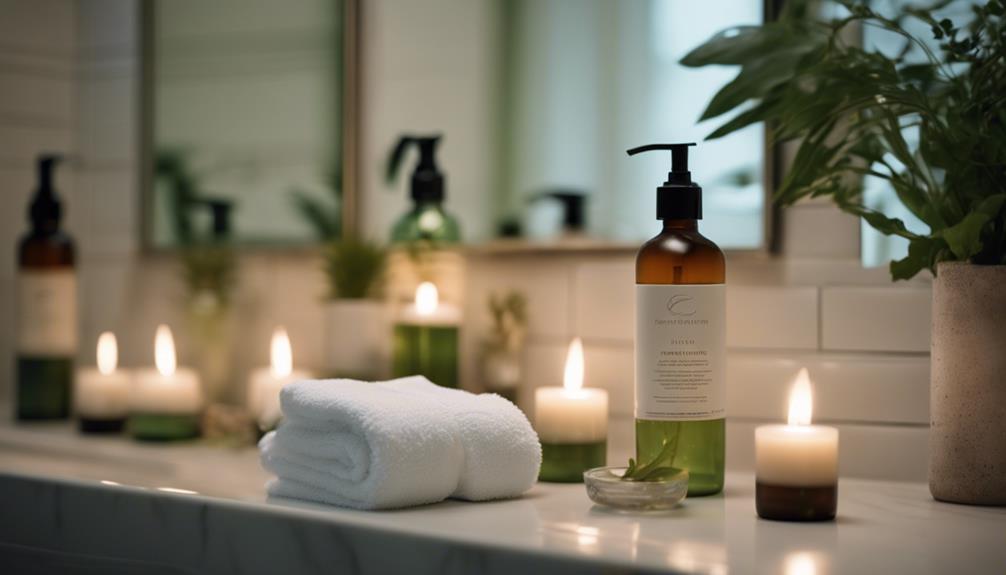
Targeted treatments and serums deliver concentrated active ingredients that tackle specific skin concerns like acne, hyperpigmentation, or aging. After cleansing and toning, apply these products to maximize their effectiveness.
Choose serums based on your skin type; for instance, if you have oily skin, opt for lightweight, water-based serums. On the other hand, if your skin is dry, richer, oil-based formulations might be more suitable.
Consistent application is key—many targeted treatments take at least six weeks of daily use before you start seeing noticeable results. To enhance the benefits of your serums, practice layering them properly. Always apply from thinnest to thickest texture, which allows for better absorption and efficacy.
Start with lighter formulations, like those containing hyaluronic acid for hydration, before moving on to heavier ones that may include retinol for wrinkle reduction or vitamin C for brightening.
Incorporating these targeted treatments and serums into your skincare routine will help you effectively address specific concerns and achieve healthier, more radiant skin. Stay disciplined with your application, and you'll reap the rewards of your dedicated skincare efforts.
Importance of Hydration

Hydration plays an essential role in maintaining your skin's elasticity and overall health. When your skin is well-hydrated, it can reduce the appearance of fine lines and wrinkles by up to 20%.
To achieve this, incorporating humectants like hyaluronic acid into your routine can be a game changer, as they attract and retain moisture, holding up to 1,000 times their weight in water.
Consider these effective strategies for boosting hydration:
- Drink plenty of water—aim for about 8 glasses a day to support your skin from the inside out.
- Use hydrating masks or serums weekly to enhance moisture levels and achieve a plump appearance.
Protective Measures Against UV
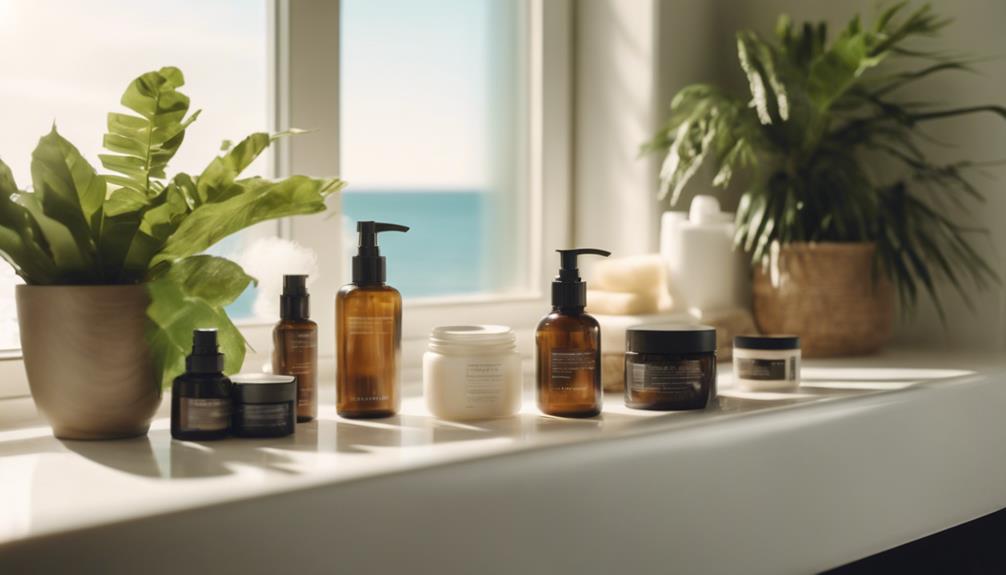
Protecting your skin from harmful UV rays is vital for maintaining its health and preventing premature aging. Daily application of a broad-spectrum sunscreen with an SPF of 30 or higher is essential. This type of sunscreen shields you from both UVA rays, which cause deep skin damage, and UVB rays that lead to sunburn.
To maximize protection, make certain to reapply your sunscreen every two hours, especially after swimming or sweating. This routine helps guarantee that your skin remains safeguarded against UV radiation throughout the day.
Additionally, consider wearing protective clothing like long sleeves and wide-brimmed hats. These garments provide an extra layer of defense against direct sunlight and reduce your risk of UV damage.
When planning your outdoor activities, try to seek shade during peak sun hours, typically between 10 a.m. and 4 p.m. This is particularly important if you have sensitive skin or a history of skin issues.
Professional Treatments and Benefits
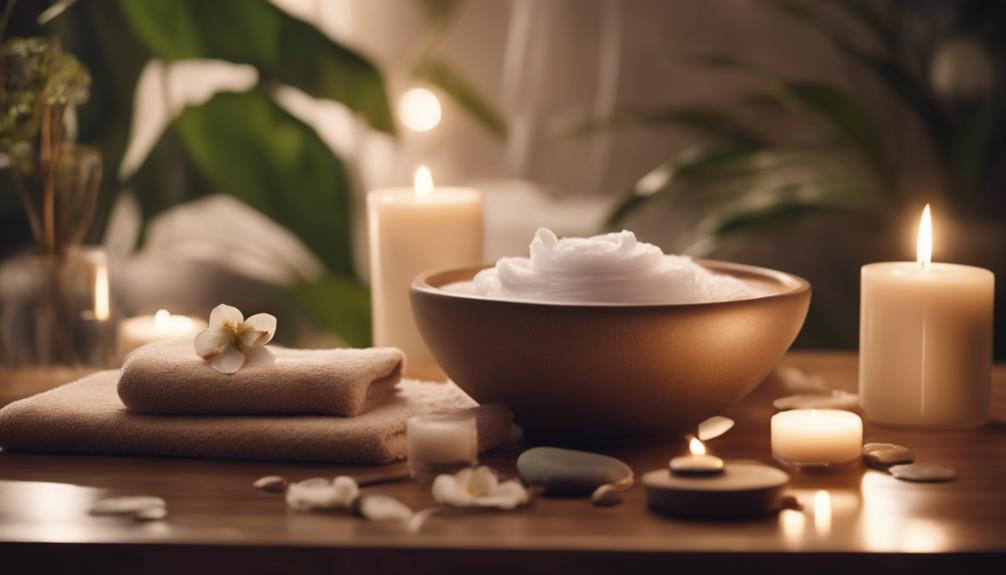
Regular professional treatments can greatly enhance your skincare routine by addressing specific concerns and delivering results that at-home products often can't match. These treatments provide deep cleansing and targeted care that are essential for effectively tackling skin issues like acne, hyperpigmentation, and signs of aging.
Consider the advantages of integrating professional care into your regimen:
- Personalized assessments: Estheticians evaluate your unique skin concerns and adjust treatments accordingly.
- Collagen production stimulation: Techniques like microdermabrasion and laser therapy boost collagen, improving skin texture and firmness over time.
Regular visits not only offer immediate results but also allow for continuous monitoring of your skin's progress, ensuring timely adjustments to your skincare regimens based on changing needs or lifestyle factors.
Customizing Your Routine

Customizing your skincare routine is vital for addressing your unique skin type and concerns effectively. Start by identifying whether your skin is normal, dry, oily, combination, or sensitive. This helps you select appropriate products tailored for optimal results.
Incorporate specific ingredients that target your issues; for instance, use salicylic acid to combat acne, hyaluronic acid for hydration, and niacinamide for a more even skin tone.
Don't forget to adjust your routine seasonally. Your skin might need extra hydration in winter and lighter products in summer to cope with environmental changes.
Schedule regular weekly treatments too. Exfoliating 1-3 times per week and using hydrating masks as needed can greatly enhance your skin's texture and health.
As you experiment with new products, it's essential to monitor your skin's response. Pay attention to any irritation or adverse reactions, and adjust your routine accordingly.
Customizing your routine allows you to create a personalized approach that not only meets your skin's current needs but also adapts over time, ensuring your skin remains healthy and glowing.
How Can I Modify My Weekly Skincare Routine to Address Dry Skin?
If you’re dealing with dry skin, consider adding a hydrating skincare routine for dry skin to your weekly regimen. Look for gentle cleansers, exfoliators, and moisturizers specifically formulated for dry skin. Incorporating hydrating ingredients like hyaluronic acid and glycerin can help improve your skin’s moisture levels and overall hydration.
Conclusion
By following this thorough skincare routine, you're well on your way to achieving healthy, glowing skin.
Remember, consistency is key! So, why not treat your skin with the care it deserves?
Tailor these steps to meet your unique needs, and don't forget to listen to your skin's signals.
With the right approach, you'll not only enhance your complexion but also boost your confidence.
Start your journey today and embrace the beauty of self-care!


